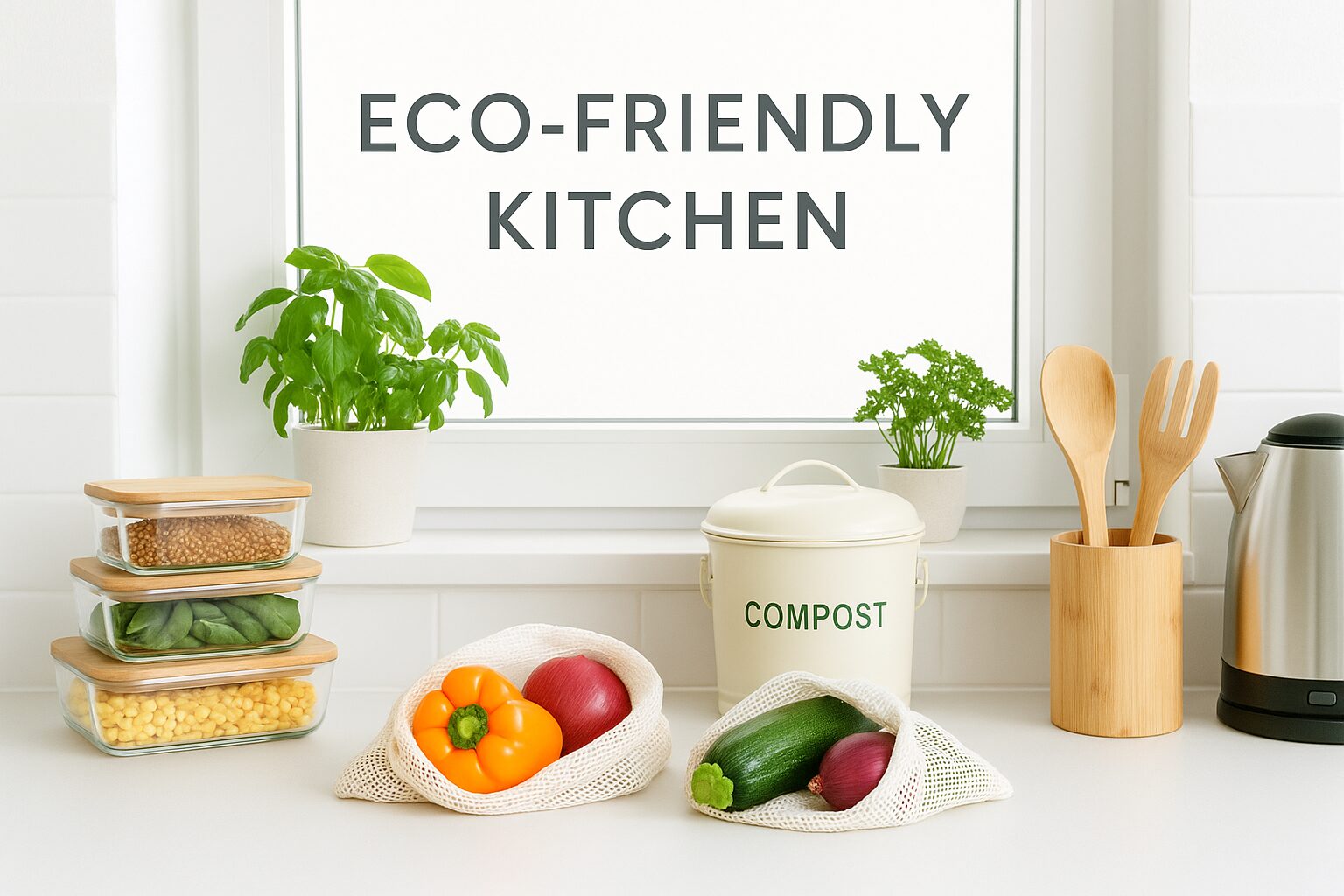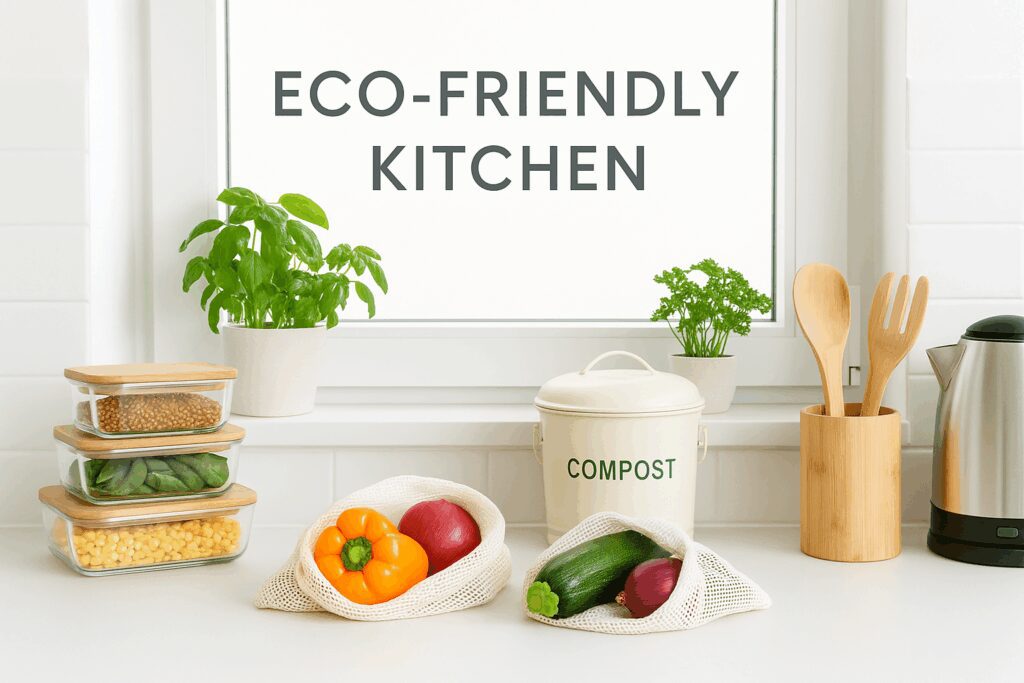

Your kitchen decisions impact more than just tonight’s dinner—they shape our planet’s future. Every plastic wrap torn, every appliance left running, and every food scrap tossed adds up to a significant environmental footprint that extends far beyond your home.
The average kitchen generates substantial waste and consumes excessive energy, contributing to environmental degradation that affects us all. But here’s the good news: implementing eco-friendly kitchen practices can reduce your carbon footprint by up to 50% while saving hundreds of dollars annually through simple swaps and mindful habits.
This comprehensive guide reveals 25 proven eco friendly kitchen practices, from quick 5-minute changes to long-term investments, complete with cost analysis and implementation strategies for every household. Whether you’re wondering how to have an eco friendly kitchen on a budget or looking to completely transform your cooking space, you’ll find actionable solutions that work for your lifestyle.

True eco kitchen practices go beyond surface-level changes. They encompass three core principles: reducing resource consumption, minimizing waste, and choosing sustainable materials. An authentically eco-friendly practice considers the entire lifecycle of products and habits—from production and daily use to eventual disposal or recycling.
According to the EPA, source reduction and reuse are the most effective ways to save natural resources and protect our environment. This means the best sustainable work practices in kitchen environments prioritize using what you already have before purchasing new items, even eco-friendly ones.
Traditional kitchen habits contribute significantly to environmental degradation. The average American household wastes approximately 32% of their food, equating to about $1,866 annually per family. Single-use plastics from food packaging end up in landfills where they take centuries to decompose, releasing harmful microplastics into our ecosystem.
Energy consumption presents another challenge. Conventional cooking methods and inefficient appliances account for approximately 4% of a home’s total energy use. When multiplied across millions of households, these seemingly small impacts create substantial environmental consequences.
Understanding your starting point helps track progress in creating an eco kitchen green eating space. Your kitchen’s carbon footprint includes:
Quick Assessment Table: Rate Your Current Kitchen Sustainability
| Practice | Never (1-3) | Sometimes (4-6) | Always (7-10) |
| Use reusable bags | □ | □ | □ |
| Compost food scraps | □ | □ | □ |
| Buy local produce | □ | □ | □ |
| Use energy-efficient appliances | □ | □ | □ |
| Avoid single-use plastics | □ | □ | □ |
| Practice meal planning | □ | □ | □ |

Traditional non-stick cookware often contains PFOA and PTFE, chemicals that release toxic fumes when overheated. These “forever chemicals” persist in the environment and accumulate in our bodies. Fortunately, excellent alternatives exist that combine performance with sustainability.
Cast iron cookware stands as the gold standard for eco-friendly kitchen practices for home. These virtually indestructible pans improve with age, provide excellent heat retention, and add beneficial iron to your diet. Stainless steel offers another durable option, while ceramic-coated cookware provides non-stick convenience without harmful chemicals.
When selecting new cookware, look for responsibly sourced materials and companies committed to sustainable manufacturing. Quality pieces may cost more initially but last decades with proper care, making them economical long-term investments.
Plastic food storage containers pose multiple problems: they leach chemicals into food, retain odors and stains, and contribute to microplastic pollution. Glass containers offer a superior alternative for kitchen practices to support sustainability. They’re microwave-safe, dishwasher-friendly, and won’t absorb flavors or colors from stored foods.
Silicone food storage bags provide another excellent swap. These reusable alternatives to zip-top bags withstand extreme temperatures, seal effectively, and last for years. For covering bowls and wrapping produce, beeswax wraps offer a natural, compostable solution that keeps food fresh without plastic waste.
Conventional cleaning products contain harsh chemicals that pollute waterways and compromise indoor air quality. Plant-based alternatives clean effectively while supporting how to make your kitchen more sustainable and eco friendly. Many natural ingredients already in your pantry—vinegar, baking soda, lemon juice—tackle tough kitchen messes without environmental harm.
Commercial eco-friendly cleaning products have also improved dramatically. Look for products certified by EPA’s Safer Choice program, which identifies cleaners meeting stringent environmental and health criteria. These products biodegrade safely and perform comparably to conventional options.
Single-use items represent low-hanging fruit for eco kitchen improvements. Reusable produce bags eliminate plastic bag waste during grocery shopping while keeping fruits and vegetables fresh. Mesh or cotton bags work well for most produce and can be washed with regular laundry.
Swedish dishcloths replace up to 17 rolls of paper towels, offering superior absorbency and durability. These compostable cloths handle spills, wipe counters, and clean dishes before being refreshed in the washing machine. Similarly, unpaper towels—cloth alternatives to paper towels—provide sustainable cleaning power for years.
Comparison Table: Traditional vs. Eco-Friendly Products
| Product Category | Traditional Option | Eco-Friendly Alternative | Initial Cost Difference | Lifespan | 5-Year Savings |
| Food Wrap | Plastic wrap ($5/month) | Beeswax wraps ($20) | +$20 | 1 year | $280 |
| Cleaning Cloths | Paper towels ($10/month) | Swedish dishcloths ($15) | +$15 | 6 months | $585 |
| Food Storage | Plastic bags ($8/month) | Silicone bags ($30) | +$30 | 5+ years | $450 |
| Produce Bags | Plastic bags (free) | Mesh bags ($12) | +$12 | 5+ years | Environmental |
Implementing sustainable work practices in kitchen environments starts with how we cook. Simple adjustments to cooking methods can reduce energy consumption by 30-50% without sacrificing food quality.
Match pot sizes to burner sizes—using a 6-inch pot on an 8-inch burner wastes 40% of the heat produced. Always use lids when boiling water or simmering foods; this traps heat and reduces cooking time by up to 25%. When baking, maximize oven use by cooking multiple dishes simultaneously or in succession while the oven remains hot.
Consider alternative cooking methods that use less energy. Pressure cookers reduce cooking time by 70%, while slow cookers use less electricity than conventional ovens. During summer months, utilize outdoor grilling to avoid heating your home and running air conditioning to compensate.
Water waste in kitchens occurs primarily through inefficient dishwashing and food preparation practices. Installing a low-flow faucet aerator—a $5-10 investment—can reduce water flow by 50% without affecting water pressure.
When hand-washing dishes, fill one basin with soapy water and another with rinse water rather than letting the tap run continuously. This method uses 50% less water than continuous rinsing. For dishwasher users, run full loads using the eco-setting, which uses less water and energy while still achieving clean results.
Food waste represents one of the most significant environmental impacts of modern kitchens. Australians alone waste 7.6 million tonnes of food annually—about 312 kilograms per person. Smart meal planning dramatically reduces this waste while saving money and time.
Start by taking inventory of existing ingredients before shopping. Plan meals that use similar ingredients to minimize spoilage, and prepare a detailed shopping list to avoid impulse purchases. Designate one meal per week as “clean out the fridge” night, creatively using leftovers and ingredients approaching expiration.
Batch cooking embodies eco friendly kitchen practices by maximizing energy efficiency and reducing daily cooking waste. Preparing multiple meals simultaneously uses oven and stovetop energy more efficiently than cooking single portions daily.
Dedicate a few hours weekly to washing and chopping vegetables, cooking grains and proteins, and preparing sauce bases. Store prepped ingredients in reusable containers for quick meal assembly throughout the week. This practice reduces energy use, minimizes food waste, and eliminates the temptation of takeout on busy nights.
Weekly Meal Planning Template for Zero Waste
| Day | Breakfast | Lunch | Dinner | Prep Notes |
| Monday | Overnight oats | Leftover Sunday dinner | Stir-fry with prepped vegetables | Use aging vegetables |
| Tuesday | Smoothie with frozen fruit | Mason jar salad | Batch-cooked soup | Freeze half for later |
| Wednesday | Toast with homemade spread | Soup from Tuesday | Grain bowl with roasted vegetables | Prep extra grains |
| Thursday | Yogurt parfait | Leftover grain bowl | “Clean out fridge” pasta | Use all partial ingredients |
| Friday | Scrambled eggs with vegetables | Sandwich with dinner leftovers | Pizza with homemade dough | Make extra dough to freeze |

Understanding how to have an eco friendly kitchen begins at the grocery store. Local, seasonal produce requires less transportation, refrigeration, and packaging than out-of-season items shipped from distant locations. According to the USDA, locally grown food typically travels less than 100 miles from farm to table, compared to 1,500 miles for conventional produce.
Seasonal eating also enhances nutrition and flavor. Fruits and vegetables picked at peak ripeness contain more nutrients than those harvested early for long-distance shipping. Visit farmers’ markets to discover what grows naturally in your region throughout the year. Building relationships with local farmers provides insight into growing practices and often yields better prices on organic produce.
Bulk purchasing supports eco kitchen green eating by eliminating excessive packaging, but it requires strategic planning to avoid creating food waste. Focus on shelf-stable items like grains, legumes, nuts, and spices that you use regularly. These products maintain quality for months when stored properly in airtight containers.
Bring reusable containers or bags to bulk stores—many now offer tare weight services so you pay only for product weight. For items prone to spoilage, consider splitting bulk purchases with friends or family. This approach provides bulk pricing benefits while ensuring everything gets used before expiring.
Navigating eco-friendly certifications helps ensure your purchases truly support sustainable work practices in kitchen environments. Key certifications to recognize include:
The Environmental Working Group publishes annual lists of produce with highest and lowest pesticide residues, helping prioritize organic purchases when budget constraints exist.
Choosing companies committed to eco-friendly kitchen practices for home amplifies your environmental impact. Research brands’ sustainability initiatives, packaging choices, and supply chain transparency. Many sustainable companies now use compostable packaging, carbon-neutral shipping, and give-back programs supporting environmental causes.
Consider joining a Community Supported Agriculture (CSA) program, which provides seasonal produce directly from local farms. These programs reduce packaging waste, support local agriculture, and often cost less than grocery store organic options. Some CSAs offer work-share opportunities, further reducing costs while connecting you with food production.
Pro-Tip Box: Seasonal Produce Calendar for Year-Round Sustainable Eating
| Season | Fruits | Vegetables | Storage Tips |
| Spring | Strawberries, Rhubarb, Apricots | Asparagus, Peas, Artichokes, Spinach | Blanch and freeze excess |
| Summer | Berries, Melons, Stone fruits | Tomatoes, Corn, Zucchini, Peppers | Can or pickle for winter |
| Fall | Apples, Pears, Grapes | Squash, Brussels sprouts, Cauliflower | Root cellar storage |
| Winter | Citrus, Pomegranates, Kiwi | Root vegetables, Cabbage, Kale | Ferment for probiotics |
Composting transforms kitchen scraps into nutrient-rich soil amendment while diverting organic waste from landfills. When organic matter decomposes in landfills without oxygen, it produces methane—a greenhouse gas 25 times more potent than CO2. Home composting provides oxygen-rich decomposition that creates beneficial soil instead of harmful gases.
For small spaces, countertop composters offer odor-free solutions that fit any eco kitchen. Bokashi systems ferment food waste (including meat and dairy) in sealed containers, while worm bins process vegetable scraps into premium fertilizer. Larger properties can utilize traditional outdoor bins or tumblers for higher volume composting.
The EPA’s composting guide provides detailed instructions for various composting methods. Start simple—even collecting coffee grounds and eggshells for garden use reduces waste while enriching soil.
Nothing embodies kitchen practices to support sustainability quite like growing your own food. Fresh herbs cost $3-5 per small package at grocery stores but grow easily on windowsills for pennies. Start with resilient herbs like basil, mint, and parsley that tolerate indoor conditions and provide continuous harvests.
Microgreens offer another space-efficient option for eco kitchen green eating. These nutrient-dense seedlings grow from seed to harvest in 7-14 days, requiring only shallow trays and indirect light. Popular varieties include pea shoots, radish greens, and sunflower sprouts—all containing higher nutrient concentrations than mature vegetables.
Effective organization makes eco friendly kitchen practices sustainable long-term. Designate specific areas for reusable bags, containers, and bottles to ensure they’re always accessible. Create a “launching pad” near your door with shopping bags, produce bags, and reusable cups for grab-and-go convenience.
Implement a clear labeling system for bulk ingredients and leftovers, including purchase or preparation dates. This prevents forgotten food from spoiling and helps maintain proper stock rotation. Consider transparent containers that allow quick visual inventory of supplies.
Creating your own cleaning products supports how to make your kitchen more sustainable and eco friendly while eliminating harsh chemicals and plastic packaging. Basic ingredients like white vinegar, baking soda, castile soap, and essential oils tackle most kitchen cleaning tasks effectively.
Store homemade cleaners in repurposed spray bottles or glass containers. Label each mixture clearly with ingredients and uses. Many recipes improve with age as essential oils infuse, making batch preparation efficient and economical.
Recipe Cards: 5 Essential DIY Cleaning Solutions
All-Purpose Cleaner
Degreasing Solution
Glass Cleaner
Drain Cleaner
Stainless Steel Polish
When replacing kitchen appliances, choosing energy-efficient models represents one of the most impactful kitchen practices to support sustainability. Energy Star certified appliances use 10-50% less energy than standard models, translating to significant savings over their lifespan.
Refrigerators consume the most energy in typical kitchens, running continuously year-round. Modern Energy Star models use 40% less energy than units from 2001. When selecting a refrigerator, choose appropriate sizing—excess capacity wastes energy cooling empty space. Features like through-door ice dispensers increase energy consumption by 14-20%.
For cooking appliances, induction cooktops offer superior efficiency, transferring 85-90% of energy directly to cookware compared to 40% for gas burners. Convection ovens cook faster at lower temperatures than conventional models, reducing energy use by 20%.
Renovating with eco-friendly kitchen practices for home in mind creates lasting environmental benefits. Prioritize durability and timeless design to avoid frequent updates. Choose cabinets made from FSC-certified wood or bamboo, avoiding pressed wood products containing formaldehyde.
For countertops, consider recycled glass, reclaimed wood, or sustainably harvested bamboo. These materials offer unique aesthetics while minimizing environmental impact. When possible, refinish existing cabinets rather than replacing them—this reduces waste and often costs 50-70% less than new installations.
Select low-VOC paints and finishes to maintain healthy indoor air quality. Natural lighting reduces electrical needs, so maximize window placement and consider skylights or solar tubes for interior spaces.
Creating an eco kitchen requires household-wide commitment. Start with one or two changes, allowing everyone to adjust before adding more. Make sustainable choices convenient—place compost bins in accessible locations and keep reusable bags visible.
Involve children through age-appropriate tasks like washing produce, sorting recycling, or tending herb gardens. Gamify sustainability with challenges tracking waste reduction or energy savings. Celebrate milestones to maintain motivation and recognize everyone’s contributions.
Monitoring improvements in sustainable work practices in kitchen environments maintains momentum and identifies areas for enhancement. Track metrics like monthly waste production, utility usage, and grocery spending. Many utility companies provide detailed usage comparisons to previous periods.
Document your journey through photos or a sustainability journal. Share successes with friends and social media communities for accountability and inspiration. Remember that perfect adherence isn’t the goal—consistent progress creates lasting change.
Monthly Sustainability Tracker Template
| Metric | Baseline | Month 1 | Month 2 | Month 3 | Goal |
| Trash Bags Used | 8 | 6 | 5 | 4 | 4 |
| Compost Created (lbs) | 0 | 5 | 8 | 12 | 15 |
| Plastic Items Avoided | 0 | 15 | 25 | 40 | 50 |
| Energy Usage (kWh) | 850 | 800 | 750 | 700 | 650 |
| Water Usage (gallons) | 2,400 | 2,200 | 2,000 | 1,800 | 1,600 |
| Money Saved | $0 | $25 | $45 | $70 | $100 |

Ready to transform your space with eco-friendly kitchen practices for home? These ten simple changes require minimal investment but deliver immediate environmental benefits. Each step takes just minutes to implement yet creates lasting positive impact.
Step 1: Switch to cloth towels (5 minutes) Replace paper towels with reusable cloth alternatives. Keep a basket of clean towels accessible and designate a hamper for used ones. Wash with regular laundry to maintain a constant supply. This single switch eliminates hundreds of paper towel rolls annually from your waste stream.
Step 2: Install a low-flow faucet aerator (10 minutes) Purchase a low-flow aerator for under $10 at any hardware store. Simply unscrew your existing faucet tip and replace with the aerator. This instantly reduces water flow by 30-50% without affecting pressure, supporting how to make your kitchen more sustainable and eco friendly.
Step 3: Start a countertop compost bin (15 minutes) Place a small container with tight-fitting lid near your food prep area. Line with compostable bags or newspaper for easy emptying. Begin collecting fruit peels, vegetable scraps, coffee grounds, and eggshells. Empty into outdoor compost or municipal collection weekly.
Step 4: Replace one plastic item with reusable alternative Choose your most-used disposable item—perhaps plastic wrap or zip-top bags. Invest in a sustainable alternative like beeswax wraps or silicone bags. Use consistently for one week to establish the habit before expanding to other items.
Step 5: Adjust refrigerator temperature for efficiency Set your refrigerator between 37-40°F and freezer at 0-5°F. These optimal temperatures preserve food safely while minimizing energy consumption. The FDA confirms these ranges prevent bacterial growth without overcooling.
Step 6: Use lids when cooking to save energy Simply covering pots and pans while cooking reduces energy use by up to 25%. Lids trap heat and steam, cooking food faster while using less gas or electricity. This basic practice exemplifies effective sustainable work practices in kitchen environments.
Step 7: Store food properly to reduce waste Learn proper storage for common items: keep tomatoes and bananas on counters, store herbs like flowers in water, and separate ethylene-producing fruits from sensitive vegetables. Proper storage extends food life by days or weeks.
Step 8: Make your first DIY cleaning spray Mix equal parts water and white vinegar in a spray bottle. Add 10 drops of essential oil for scent if desired. This simple solution cleans most surfaces effectively while eliminating plastic bottles and harsh chemicals from your eco kitchen.
Step 9: Designate reusable shopping bags Gather reusable bags and hang them on a hook by your door or keep them in your car. Place a reminder note on your shopping list or set a phone alert. Building this habit eliminates hundreds of plastic bags annually.
Step 10: Audit and organize your pantry Spend 15 minutes reviewing pantry contents. Note expiration dates, consolidate duplicate items, and plan meals using ingredients approaching expiration. This prevents waste while revealing what you actually use versus impulse purchases.
Mistake 1: Throwing away functional items to buy eco-alternatives The most sustainable choice is using what you already own. Discarding functional plastic containers to purchase glass replacements creates unnecessary waste. Instead, transition gradually as items wear out naturally. This approach honors the resources already consumed while moving toward eco friendly kitchen practices.
Mistake 2: Focusing only on products, not habits Purchasing eco-friendly products without changing behaviors limits environmental impact. A bamboo cutting board won’t help if you still waste food or leave appliances running unnecessarily. Sustainable habits like meal planning and energy conservation matter more than any single product swap.
Mistake 3: Attempting too many changes at once Overwhelming yourself with simultaneous changes often leads to abandoning efforts entirely. How to have an eco friendly kitchen success comes from gradual, sustainable progress. Master one or two practices before adding more. This builds confidence and creates lasting change rather than temporary enthusiasm.
Mistake 4: Ignoring the cost-benefit analysis Not all eco-friendly swaps provide equal value. Prioritize changes offering maximum environmental benefit for your investment. For example, reducing food waste and installing water-saving devices typically provide greater impact than purchasing expensive specialty products.
Mistake 5: Not involving the whole household Sustainable kitchens require everyone’s participation. Failing to communicate changes or gain buy-in from family members undermines efforts. Explain benefits, assign age-appropriate responsibilities, and make sustainable choices as convenient as conventional ones. Create an eco kitchen green eating culture through inclusive planning and shared goals.
Understanding the financial aspect of eco-friendly kitchen practices helps prioritize investments. While some changes require upfront costs, most pay for themselves within months through reduced ongoing expenses.
Low-Cost Switches ($0-50)
Medium Investments ($50-200)
Larger Investments ($200+)
According to the NRDC, the average family of four loses $1,500 annually to food waste alone. Combined with energy and water savings, sustainable work practices in kitchen environments typically save $2,000-3,000 yearly.
Annual Savings Breakdown:
The value of kitchen practices to support sustainability extends beyond monetary savings. Reducing exposure to chemicals in conventional cleaning products and non-stick cookware provides invaluable health benefits. Eating more local, seasonal produce typically increases nutrient intake while decreasing pesticide exposure.
Indoor air quality improves dramatically when eliminating harsh cleaning chemicals and choosing low-VOC materials. These changes particularly benefit children and those with respiratory sensitivities, potentially reducing medical costs and improving quality of life.
Interactive Savings Table: Calculate Your 5-Year ROI
| Investment Category | Initial Cost | Annual Savings | 5-Year Net Benefit | Payback Period |
| Food Waste Reduction | $100 | $1,000 | $4,900 | 1.2 months |
| Water Conservation | $50 | $150 | $700 | 4 months |
| Reusable Products | $150 | $400 | $1,850 | 4.5 months |
| Energy Efficiency | $500 | $300 | $1,000 | 20 months |
| Bulk Buying Setup | $200 | $300 | $1,300 | 8 months |
| Total Portfolio | $1,000 | $2,150 | $9,750 | 5.6 months |
Start with free or low-cost changes that deliver immediate impact. How to make your kitchen more sustainable and eco friendly doesn’t require large investments. Begin by reducing food waste through meal planning and proper storage—this actually saves money immediately. Switch to cloth towels, make DIY cleaning products, and shop with reusable bags. These simple swaps cost under $50 total but eliminate hundreds of dollars in disposable products annually.
Look for second-hand options when upgrading cookware or appliances. Thrift stores often have quality cast iron and stainless steel pieces at fraction of retail prices. Many utility companies offer rebates for energy-efficient appliances, further reducing costs.
The most impactful eco friendly kitchen practices address the largest sources of waste and consumption. Reducing food waste provides the greatest environmental and financial benefit—start here with meal planning and proper storage. Installing a low-flow faucet aerator takes minutes but saves thousands of gallons annually.
Switching from disposable to reusable products eliminates ongoing waste streams. Focus on your most-used disposables first: paper towels, plastic wrap, or coffee filters. These changes require minimal effort but create lasting positive impact.
Modern eco-friendly products often outperform conventional alternatives. Cast iron and stainless steel cookware last decades versus years for non-stick options. Swedish dishcloths absorb 15 times their weight—far exceeding paper towels. Natural cleaning solutions like vinegar and baking soda tackle tough messes without leaving chemical residues.
The key lies in choosing quality eco-friendly products rather than the cheapest options. Read reviews, seek recommendations, and invest in well-made items that enhance your eco kitchen green eating experience while protecting the environment.
Individual actions create collective impact. If every American household implemented basic kitchen practices to support sustainability, we would divert millions of tons from landfills annually. The EPA estimates that reducing food waste by just 15% would feed 25 million Americans annually.
Your sustainable choices influence others through example. Friends and family observing your successful eco kitchen often adopt similar practices, multiplying impact exponentially. Every sustainable choice votes for the world we want to create.
Trustworthy certifications ensure products meet environmental and health standards. Look for Energy Star on appliances, confirming energy efficiency. FSC certification indicates responsibly sourced wood products. USDA Organic and Non-GMO Project verify food production standards.
For cleaning products, EPA Safer Choice identifies formulations meeting strict health and environmental criteria. Cradle to Cradle certification evaluates entire product lifecycles. These third-party verifications provide confidence in your sustainable purchases.
Successful adoption of eco-friendly kitchen practices for home requires household cooperation. Start conversations by sharing environmental and financial benefits. Involve family members in choosing which changes to implement first, creating ownership in the process.
Make sustainable options more convenient than conventional choices. Keep reusable bags visible, place compost bins in accessible locations, and stock appealing reusable containers. Celebrate successes together and remain patient with occasional lapses as new habits form.
Implementing these 25 eco-friendly kitchen practices transforms your cooking space into a sustainability hub that benefits your health, wallet, and planet. From simple swaps like cloth towels to comprehensive approaches involving meal planning and energy efficiency, each practice contributes to meaningful environmental protection.
Remember, creating an eco friendly kitchen doesn’t demand perfection or immediate wholesale changes. Start with one or two practices that resonate with your lifestyle. As these become habitual, gradually incorporate additional sustainable choices. This measured approach ensures lasting transformation rather than temporary enthusiasm.
The journey toward sustainable work practices in kitchen environments offers rewards beyond environmental impact. You’ll discover fresher, more flavorful foods through seasonal eating. Your home’s air quality improves by eliminating harsh chemicals. Monthly savings accumulate into significant annual amounts. Most importantly, you’ll gain satisfaction from aligning daily actions with environmental values.
Start with one practice today—download our free Kitchen Sustainability Audit Checklist and join thousands creating greener kitchens worldwide. Whether you begin with a simple faucet aerator or dive into composting, every action matters. Your eco kitchen green eating space awaits, ready to nourish both your family and our shared planet for generations to come.
